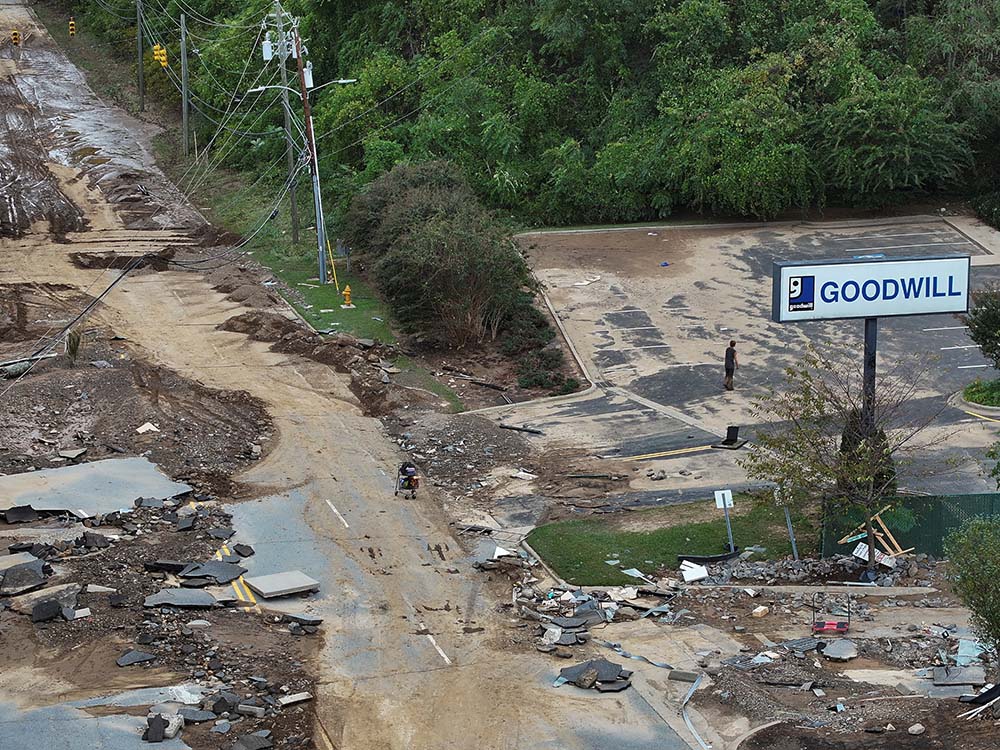
A drone view Sept. 29 shows a damaged area in Asheville, North Carolina, following the passing of Tropical Storm Helene. The storm made landfall at 11:10 p.m. (Eastern time) Sept. 27 in Florida's Big Bend as a Category 4 hurricane and was downgraded to a tropical storm the next morning. (OSV News/Reuters/Marco Bello)
The priests of St. Eugene Parish in Asheville, North Carolina, were doing their best to help people suffering from the devastation of Hurricane Helene, which left at least 30 people dead in Buncombe County.
Maryknoll Fr. Doug May, who has been based out of St. Eugene while doing mission promotion tours for the last nine years, called the situation "surreal" and said people would "need each other to survive and get on with our lives once we get through this."
May spoke to NCR via WhatsApp, from a Verizon emergency outpost in downtown Asheville Sept. 30, four days after Hurricane Helene hit Florida's Big Bend region. Rain was already falling in Western North Carolina when the hurricane hit. Asheville experienced more than 17 inches of rain; Busick, North Carolina, about 40 miles northeast of Asheville, received more than 30 inches of rain by Sept. 28.
"Asheville has not experienced such devastating rains, winds, flooding and an almost total breakdown of the infrastructure for over a century," May told NCR. "With few exceptions, we've had no electricity, water or telecommunications for the last five days. Crews are gradually clearing major and secondary roads of downed trees, downed power lines and landslides."
"Generally, there are no current means to text or call," he said. "There are approximately 30 people standing around and sitting in their cars trying to contact family and friends to assure them that they are safe and hear their voices."
May said that, just as during the COVID-19 pandemic in 2020, the priests of St. Eugene were "doing our best to offer weekday and weekend Masses by candlelight for those who show up" and were making emergency calls, "provided that folks have a way of contacting Fr. Pat Cahill, the pastor, or me."
'Many of us are still in shock that we've been so vulnerable and that it's already taken several days to get the basic infrastructure up and running again after the political powers that be assured us that they were prepared.'
—Maryknoll Fr. Doug May
For a few hours at one point, the parish had water and power. One parishioner came to the rectory to take a shower; another came to fill up a tank with water; and some parishioners came to offer the priests food.
May visited a nursing home Saturday to anoint one woman and her sister who contacted him, and Cahill "actually witnessed two marriages by candlelight." May said brides were upset because their "reception venues were wiped out by the flood."
"Many of us are still in shock that we've been so vulnerable and that it's already taken several days to get the basic infrastructure up and running again after the political powers that be assured us that they were prepared," he said.
"As in most crisis situations, one witnesses the best and worst of humanity. Folks are reaching out to help with food and water while there are fights in lines waiting for gas," he added.
Asheville is part of the Charlotte Diocese, which has a link for giving to help storm victims through its Catholic Charities agency here: https://ccdoc.org.
Hurricane Helene, with sustained winds of 140 mph, made landfall in a sparsely populated area of Florida, then left a path of destruction across the Southeast.
Advertisement
By midday Sept. 30, the death toll from the hurricane had surpassed 100, with deaths in North Carolina, Georgia, Florida, South Carolina, Tennessee and Virginia. The toll was expected to rise as rescue and recovery operations continued.
By late Sept. 29, more than 2 million customers remained without power in the Southeast, the Associated Press reported. The states' officials were coordinating with the Federal Emergency Management Agency.
Scientists have repeatedly found that climate change is supercharging hurricanes and other tropical storms as they absorb more heat from warmer ocean waters, providing fuel for heavier rainfall and higher storm surge once they make landfall.
Human activity, primarily burning fossil fuels (coal, oil, gas), is the primary driver of climate change. Catholic and other faith leaders have pointed persistently to the disproportionate harm the impacts of rising temperatures have on poor and marginalized communities.
In eastern Tennessee, Unicoi County Hospital was so flooded Sept. 27 that at least 54 people were rescued from the roof and more were rescued by boat. On Sept. 30, officials said more than 40 people remained missing, and at least 100 first responders were searching debris.
In Erwin, the county seat, Glenmary missionaries at St. Michael the Archangel mission mobilized to help people with meals, water, cleaning supplies, and other support.
"The future needs will be great and will go on for months," said an appeal on the Glenmary Home Missions site.








